Send a Raven: Newsletter #10
Learning to walk the (time)line: surrendering to the moment while playing the long game
Happy love month, Ravens!
I’m gonna be honest… Much like last month, this month has had an… Interesting start (more on that later). This is actually my second time sitting down to compose this newsletter, because the first time, much like every Canadian’s attitude by February—the shortest month that seems to stretch winter into oblivion, I just wanted to fucking get it over with.
I feel like somewhere along my Substack journey, what started out as a monthly consolidation of random updates quickly morphed into something more; something poetic, something creative, something I never knew I was capable of.
And the best part was that it was completely subconscious; a result of dumping my feelings until they took on the form of something that allowed me to trust in my potential, and act on my inspiration. It has taught me not only what creative writing truly is, but has shown me the beauty that lies in surrendering to the moment; allowing myself to indulge in something that serves no long-term goal, and find pride in that.
I never liked to journal—yeah, I know. I never liked to write, either, believe it or not. Because both always felt like a chore: a fruitless additional bullet on my to-do list; but over time, like many of my daily chores, I’ve come to appreciate them for purposes of routine, release, and reward. And that’s what this newsletter has come to symbolize for me: a monthly dose of rejuvenation (which, in the middle of a weeks-long cold snap, I’ve never needed more).
But when I sat down a week ago, ready for my medicine, it never came. I couldn’t identify any themes laced within the recent events of my life, or find a way to weave them into meaningful words. Instead, what I found myself with was a familiar feeling of dread.
At the beginning of this month, I learned that I’ve been suffering with a hiatal hernia (in short, my stomach is being sucked into my esophagus) for nearly a decade of my life. I also learned that the severity of my condition is as bad as it can possibly get, and that I need major (potentially even open) surgery to repair it.
This news has rocked me to my (apparently severely damaged) core, and has given me a whole new appreciation for WebMD telling me that I have cancer every time I google symptoms, because I can now say with certainty that I would much rather be severely over-prepared, than grossly under-prepared.
I’ve spent most of my adult life (especially living somewhere with “free” healthcare) hearing people equate their feelings about late diagnosis’, to grief. And until I spent days staring at the wall after receiving my prognosis, I never understood that comparison.
But now I understand; the anger, the denial, the acceptance—all battling one-another, pulling me in every direction. On one hand, I’m grateful to have such a validating answer; to know that everything I felt and subsequently brushed off was indeed exactly what was happening all along. On another, I feel blindsided; shell-shocked to know that there is actually something wrong after having convinced myself that my tests would come back normal, and I’d be told to take better care of myself. Next to that, I’m thrilled to know that the physical discomfort I feel every single day is indeed not normal; and soon I’ll get to know what normal feels like. And on the opposite side of that… I’m devastated, because for years I blamed myself for something that was far beyond my control.
For my entire life, I have viewed myself as a lazy person. And I’ve always been shocked to hear how shocked people are when I say that… Deep down, I know that I’m not. But how can I not feel like I’m not when I can’t climb a flight of stairs without needing an inhaler? Can’t do sit-ups without feeling like I’m going to puke? Can’t enjoy a yoga class without flirting with unconsciousness? Can’t walk around the mall without breaking a sweat? The simple answer was always that I was just out of shape, and because I truly haven’t ever known any different, it was easy to feel like I was just too far gone.
I’m the kind of person who tries not to dwell on the past, and in truth it’s very rare that I feel the urge to, but it’s times like this that make it hard not to wonder how much easier my life would’ve been had I not had this problem, or identified it sooner… How much stronger I would’ve been had I not viewed myself as so naturally weak; how much more I would’ve believed in myself had I not felt like my best was never good enough; how much more I could’ve loved myself had I not spent years having daily self-worth demeaning thoughts. And as somebody who has gone through a suicidal episode partially due to years of self-inflicted mental abuse, realizing just how much this has contributed to that has been a tough pill to swallow. I feel betrayed, but I have nobody to blame, and the natural reaction is to blame myself…
The hard truth, and the only way to stop myself from repeating the unnecessary cycle of self-blame that this whole ordeal has helped me recognize, is understanding that at this point in time, none of the answers to these questions matter, and that is what I need to accept.
Needless to say, the last couple of weeks have been a massive hindrance on my ARAC #1 editing progress that I couldn’t afford last month—the longest month I’ve ever experienced—so now that we’re over halfway through the shortest month of the year, I’m feeling the pressure more than ever. And in an incredibly unproductive spiral, I am once again feeling like I’m in over my head. If I can’t get a book that has already been written, edited and released in a year, how am I supposed to write a whole new book to be released just a year-and-a-half later, like I’d planned? And another just six months after that?
Is it any more productive to give the stress additional attention by writing about it? Perhaps not. But I always wanted this newsletter to be an honest representation of what it’s like trying to make it as an author. And unfortunately, doubt is part of it.
I’ve talked many times about my experience with rewriting ARAC, and all of the deep-rooted reasons as to why I’ve gone about it in such an unconventional way (this pretty much sums it up), but as I continue the journey of taking my writing from a coping-mechanism to a career, I find myself faced with a new deep-rooted reason to work through: my problem with authority—even if that authority is myself.
The idea that I’m something of a non-conformist is nothing new, but I never realized the ways that it extended to my writing until I started coming around to the idea that simple step-by-step novel writing/editing methods do exist and do work for a reason. I thought that realization would be the end of it. But it wasn’t until a conversation during an anxiety attack about trying to write this newsletter helped put it into perspective for me…
“When you’re anxious or upset, does it help if you write?”
The answer was an easy yes. But it got me thinking… In the past few years, I no longer turn to writing when I’m anxious or upset, because in the past few years my writing hasn’t been writing, it’s been editing; rewriting—things that are contingent on plotlines already set out, and have nothing to do with creativity or how I’m feeling in the moment. I have to conform to whatever is already on the page. And though I may have broken past being a mood writer, I’m still learning the discipline that it takes to be a professional author.
Trying to teach myself that discipline will allow me to flourish when I’ve spent my whole life associating rules with feeling trapped (a whole other can of childhood-trauma-worms) has been no easy feat, but the release date that I’ve chosen for ARAC is something that I refuse to compromise. So instead of pushing the date, I’ve decided to amend my release strategy a bit, and push ARCs to mid-April instead of mid-March (which, thankfully, was an idea I’d toyed with in the beginning anyways).
On a positive note, the impending doom that I will not meet my release date is helping me focus less on how goddamn long this book is going to be—another concern I’m learning to unlearn. Which is odd, because for the longest time I’d always felt like the longer the book, the better. But I guess shifting from a reader to an author, I see things differently—especially in a world of fast-everything. And maybe it’s not a bad thing to be more realistic about the industry I’m operating in, but I hope that as I make it through my first release, I won’t be faced with so many uncertainties to hyper-fixate on.
Another positive? I’m starting to break the barrier of shame when it comes to the horrible awful cringy novel promo, bookstagram trends, and author reels, because not only have they been my only spur-of-the-moment creative outlet, they’re actually working (who would’ve thought…)

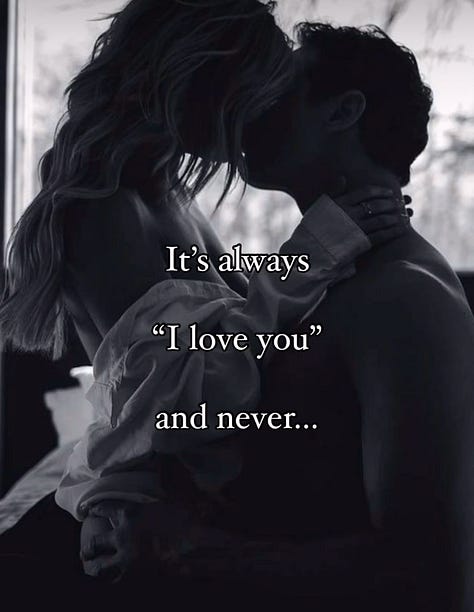
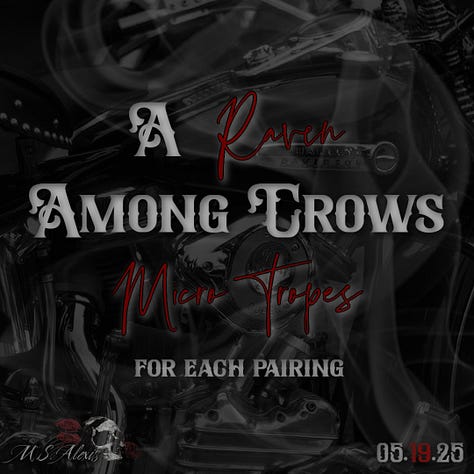

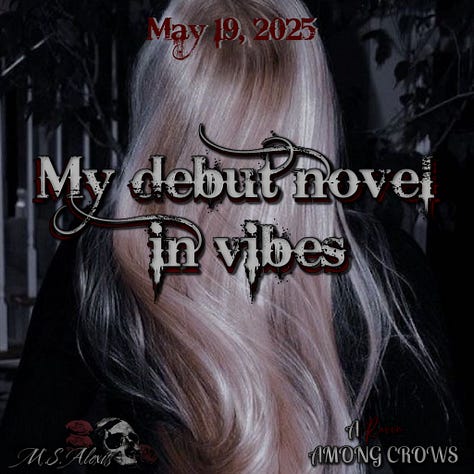

On the reading front, I’ve roped my boyfriend into listening to audiobooks with me, and he loves them (the greenest flag I’ve ever seen), my friend and I have started a little book club, and there are plenty of upcoming releases that I am literally foaming at the mouth for (Scythe & Sparrow—which I’ll probably be finished by the time this newsletter goes out, Sunrise on the Reaping, and C&V by
, to name a few), but I feel like I’ve hit a bit of a wall with my last few reads, and with Freida McFadden, specifically (I really thought she was gonna be my author, guys…). But I’m keeping an open mind that maybe the slump I’ve found myself in has less to do with the content, and more to do with my mental state.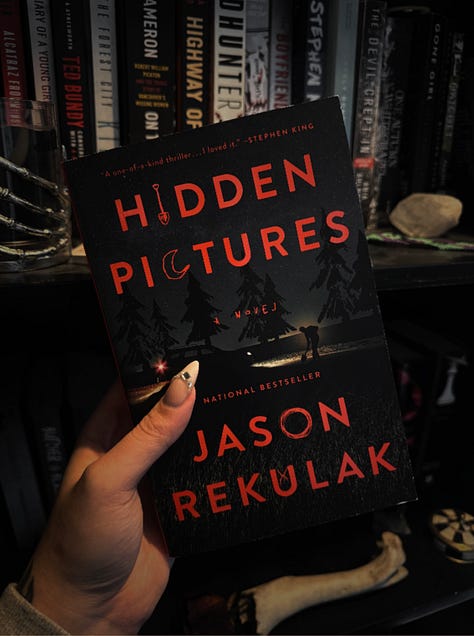

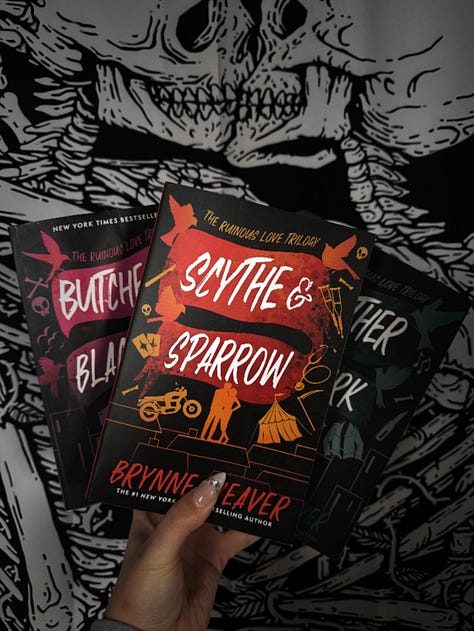
All in all, the last few weeks have been a bit of a write-off. But I’m trying to take my own advice and remember that it’s not how you start the year (because my year has started off heavily reliant on Crumbl, my bathtub, and Real Housewives of Salt Lake City), it’s how you end it. And sometimes, all you need to do is give things a little bit of time to take shape.




